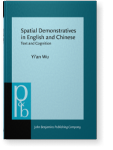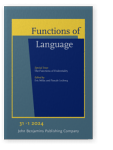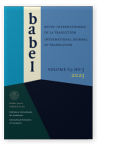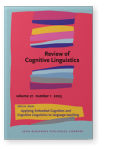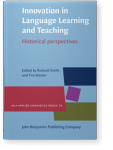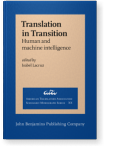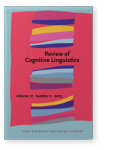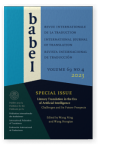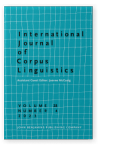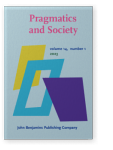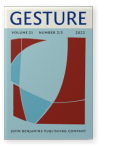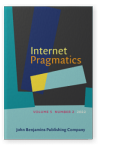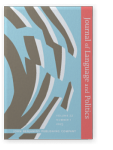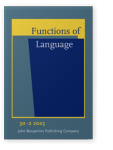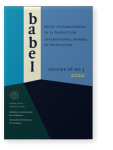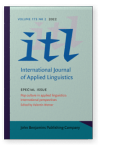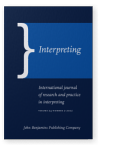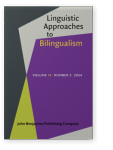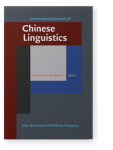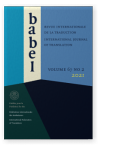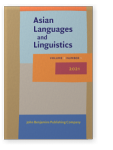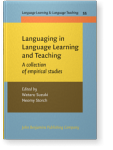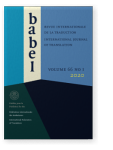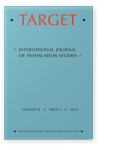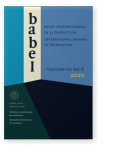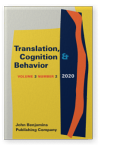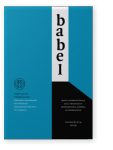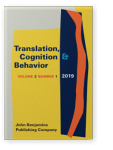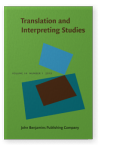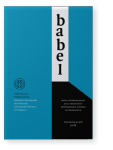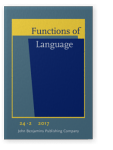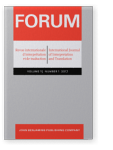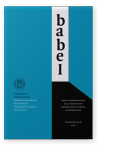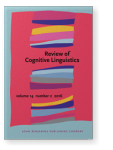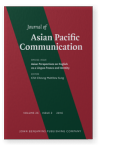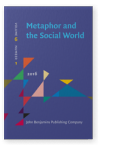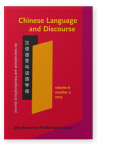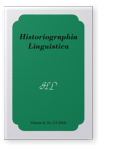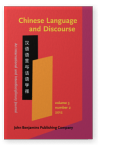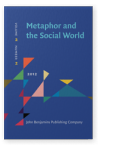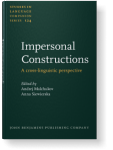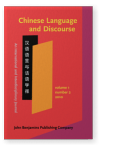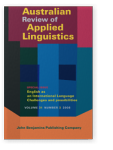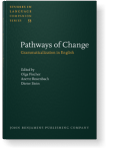Beijing Foreign Studies University
List of John Benjamins publications for which someone affiliated with Beijing Foreign Studies University plays a role.
Title
2023 An eye-tracking study of productivity and effort in Chinese-to-English
translation and post-editing
In: Translation in Transition: Human and machine intelligence[American Translators Association Scholarly Monograph Series, XX] pp. 57–82
Keywords cognitive effort | post-editing | human translation | eye-tracking | key-logging | Chinese-to-English
2023 Collostructional analysis on Chinese modal verb construction neng bu neng + VP
Keywords
neng bu neng + VP | collostructional analysis | prototypical meaning | extensional meaning
2023 Defending the last bastion: A sociological approach to the challenged literary translation
Keywords translator’s habitus | actor-network | human signification | machine simulation | positive ethics | Habitus du traducteur | réseau d’acteurs | signification humaine | simulation par la machine | éthique positive
2023 Dative alternation in Chinese: A mixed-effects logistic regression analysis
Keywords dative alternation in Chinese | double object construction | prepositional dative construction | mixed-effects logistic regression model
2023 Metaphor analysis of the COVID-19 public health emergency on Chinese national news media
Keywords Critical Metaphor Analysis | COVID-19 pandemic | metonymy | Chinese national news media
2022 Do ‘say’ verbs really grammaticalize into complementizers through clause combination?: Evidence from Chinese shuō ‘say’
Keywords ‘say’ verb | shuō | complementizer | quotative particle
2022 Understanding the mediation of dialectal value: A case study of Chinese translations of Pygmalion
Keywords dialectal value | dialect translation | language ideology | social structure | translator’s positioning | valeur dialectale | traduction de dialectes | idéologie linguistique | structure sociale | positionnement du traducteur
2022 “¿Triste estás? I don’t know nan molla”: Multilingual pop song fandubs by @miree_music
Keywords fandub | dubbing | fan translation | informal language learning | translanguaging | identity
2022 Exploring the predictive validity of an interpreting aptitude test battery: An approximate replication
Keywords aptitude testing | SynCloze | negative affectivity | learning styles
2022 L2 acquisition of the Chinese plural marker -men by English and Korean speakers
Keywords feature reassembly | L2 acquisition of plural marking | L1 transfer | Chinese plural marker -men
2021 A cartographic approach to sentence production in aphasia: Evidence from Chinese
Keywords cartographic approach | agrammatic aphasia | Chinese
2021 A cross-boundary approach to the generative nature of translation
Keywords TS research | cross-boundary approach | translational generativity | Chinese philosophic-cultural elements | TS research | approche transfrontalière | générativité de traduction | éléments philosophiques et culturels chinois
2021 An aggregate approach to diachronic variation in modern Chinese writings and translations
Keywords modern Chinese | diachronic variation | corpus-based study | hierarchical agglomerative clustering | multidimensional scaling
2020 Languaging: Chinese students rewrite a narrative in English
In: Languaging in Language Learning and Teaching: A collection of empirical studies[Language Learning & Language Teaching, 55] pp. 129–148
Keywords story rewriting task | EFL learner | languaging | models
2020 A review of 40 years of interpreting research in China (1978–2018)
Keywords 40 years of interpreting research | China | overall | period-specific characteristics | 40 ans de recherche en interprétation | Chine | caractéristiques générales | caractéristiques propres à une période
2020 Language contact through translation: The influence of explicitness in English–Chinese translation on language change in vernacular Chinese
Keywords explicitation | explicitness | language change | language contact | English–Chinese translation | adversative conjunctions
2020 Professional interpreting translation education in the Chinese mainland: History, achievements, challenges and future prospects
Keywords reform and opening up | professional interpreting and translation education | achievements | challenges | countermeasures | réforme et ouverture | enseignement de l’interprétation et de la traduction professionnelles | réalisations | défis | contre-mesures
2020 Researching the motivation of Spanish to Chinese fansubbers: A case study on collaborative translation in China
Keywords volunteer translation | fansubbing | China | collaborative translation | translator motivation
2019 A duet and/or a concerto?: Simultaneous interpreters’ working memory and interpreting expertise
Keywords working memory | interpreting expertise | simultaneous interpreting | roles and impacts | mémoire de travail | expertise en interprétation | interprétation simultanée | rôles et impacts
2019 Chinese scholarship in Cognitive Translation Studies: A survey of researchers
Keywords translation process | interpreting process | cognitive approaches | translation process research
2019 Mapping translation studies in China based on Holmes/Toury Map
Keywords Translation Studies in China | Holmes/Toury map | research features | changing trends | Études de Traduction en Chine | carte Holmes/Toury | caractéristiques de recherche | tendances d’évolution
2019 The fuzzy interface between censorship and self-censorship in translation
Keywords censorship | self-censorship | fuzzy interface | cultural politics | Chinese context
2019 The origins and early developments of the UN Training Program for Interpreters and Translators in
Beijing
Keywords UN Training Program for Interpreters and Translators | interpreter training in China | Beijing Foreign Studies University | syllabus for interpreter training | programme de formation des interprètes et traducteurs de l’ONU | formation des interprètes en Chine | Université des Études étrangères de Beijing (BFSU) | syllabus de formation d’interprètes
2019 Propositional information loss in English-to-Chinese simultaneous conference interpreting: A corpus-based study
Keywords English-to-Chinese simultaneous interpreting | corpus | propositional information loss | cognitive resource deficiency | cognitive capability deficiency | interprétation simultanée de l’anglais en chinois | corpus | perte d’informations propositionnelles | manque de ressources cognitives | manque de capacités cognitives
2017 La créativité issue de l’intégration conceptuelle dans le cas de la traduction transitoire vers la langue acquise
Keywords approche cognitive | pertinence | intégration conceptuelle | structure émergente | traduction vers la langue B | cognitive approach | relevance | conceptual blending | emergent structure | translation into B language
2017 English and Mandarin speakers’ mental representations of time: Some new evidence about the language-thought relationship
Keywords time | spatiotemporal metaphor | thought | language | space | writing direction
2016 Global and national identity construction in ELF: A longitudinal case study on four Chinese students
Keywords global identity | national identity | community of practice | ELF | imagined community
2016 Pictorial-verbal metaphors in Chinese editorial cartoons on food safety
Keywords multimodal metaphor theory | Conceptual Metaphor Theory | pictorial-verbal metaphor | food safety | editorial cartoon
2016 Corpus-based Chinese studies: A historical review from the 1920s to the present
Keywords corpus linguistics | Chinese | discourse-pragmatics | classical/historical Chinese studies | lexical frequency studies | syntactic/grammatical studies | interlanguage studies
2014 Measuring translation difficulty: An empirical study
Keywords translation | difficulty | empirical workload | cognitive | readability | competence | measurement | method
2013 Une quantification expérimentale des messages restitués dans la courbe d’apprentissage de l’interprétation
Keywords Quantification | quality | formative evaluation | information unit | learning curve | topic preparation
2013 A cognitive perspective on the metaphors in the Buddhist sutra “Bao Ji Jing”
Keywords conceptual blending | Buddhist sutra | conceptual metaphor | “Bao Ji Jing”
2010 Apology strategies between social unequals in The Dream of the Red Chamber
Keywords power relationship | apology | social status | apology strategy
